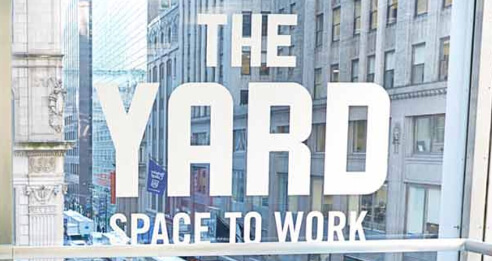
Largest Coworking Companies


Karen Condi, the president of Workspace Strategies, started the company approximately fourteen years ago. When WS first began, it was as a pure consulting company catering to the shared workspace industry. Today, WS still takes on consulting projects for new and expanding centers but focuses primarily on management of coworking and shared workspace properties. The Company has witnessed the coworking trend from its inception to the current explosion of hospitality-focused and community-oriented spaces around the country. The Workspace Strategies team powers several shared workspace companies through full management services.
Karen believes coworking owners need to have a strong focus on their community to experience the most success and she helps them accomplish this, “We’ve been in the industry a long time, we’ve learned from our own mistakes and help others from making the same mistakes we did early on,” she says. “We stay ahead of the curve on everything we do.”
We spoke with Condi about her typical strategy when working with new or existing coworking owners and she broke down the consulting phases for the majority of projects into three stages.
First, she and her team begin with a deep dive into the specific market for the potential coworking space location. They fully analyze the demographics, economic indicators, and similar service providers in the market. This helps determine the best product mix and pricing. From there they put together a detailed report on the feasibility, including a pro forma that includes start up expenses, ramp up scenario and the stabilized scenario along with a 5-year projection for the business. “The feasibility study helps the owner fully assess if this is a go ahead or not,” Condi says. It’s a fairly quick process and takes her about four weeks to complete from start to finish.
Condi uses her own team and works to launch the space. From finalizing the space layout and choosing furniture to implementing all of the necessary operational systems, hiring staff, training staff, and marketing the space. The team does everything (and anything) to get the doors open successfully. Assuming that the real estate is secured (which, she predicts, could take up to a year), the Workspace Strategies team immediately begins transforming the space, taking anywhere from six to nine months to complete phase two.
Phase three involves some type of ongoing consulting project, or full management, of the space. The WS team manages many properties for larger enterprises and property companies who understand the profitability a shared workspace/coworking space generates but don’t want to manage the day-to-day needs of the business themselves.
“Our clients see the value in coworking but they don’t want to manage all the details of a coworking space themselves. This is a very hands on business,” she says. “Operating a coworking space is more like operating a hotel.” Her long-term consultation projects can last anywhere from six months to many years, it depends on the specific needs of her clients.

A major ongoing trend is property companies entering the coworking game and Condi helps her clients, who own commercial real estate properties, take advantage of these opportunities for revenue growth.
“Incorporating a coworking business into your commercial property investment generates ROI in the form of both market rate rents paid by the business and profitability from the coworking business,” she says. While many shared workspace and coworking operators lease space from a landlord, those operators who both own the building and the business generally see two to three times the normal yield on their real estate investment compared to a traditional office lease tenant.
Condi shared three pieces of expert advice for new coworking space owners:
“We believe in scale,” Condi says. “We see a lot of small spaces, under 10,000 square feet, opening. This is not something we typically recommend, because it’s harder to enjoy profitability on a small space—we believe you really need to scale to make it.”
“Location is absolutely everything,” Condi says. “ People want to work close to where they live. After you find the ideal location, you must build the community and make sure all proper service elements are built into the space; but truly, if you don’t have a convenient location for your target audience, it’s not going to work.” This is one reason why having a feasibility study completed is so important.
“That’s one of our main principles at our own office,” Condi says. She uses tools like Kisi to help her accomplish that. “We’re able to have people book their meeting rooms and they can use the app to access the doors, and they don’t have to rely on a team member.” Condi sees members book rooms during after hours, “Meeting space revenue is a high dollar line on our P&L reports each month,” she says. “Before the door integration we couldn't track that revenue and it wasn’t easy for people to do business with us.”

Condi believes coworking space owners can benefit from working with consultants. “We like to first discuss our clients values and mission statement and then we cater their marketing around that,” she says.
Condi makes sure to match the personality of the space with the staff she hires. “We absolutely cater our services for each space, but the engine or system we deploy is the same.”
What’s the most important thing for a coworking space owner, other than location?
“Spend money on marketing up front and don’t be afraid to start spending money on payroll for a talented on-site manager 60-90 days before your doors open,” Condi says.
“Spending those dollars in the beginning will benefit you later because no one wants to be in an empty space. As long as potential members see empty spaces, they will try to negotiate your price down. It’s much easier to sell a full building than an empty one.”
Save your community manager 41 hours each week—learn how The Yard did it with cloud-based access control.
Read the Case StudyThe Guide to Make Your Space More Profitable
Including interviews with experts and consultants.
Free access to our best guides, industry insights and more.
